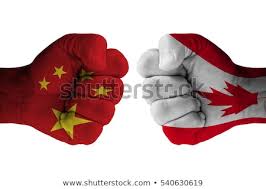
According to reports, a diplomatic dispute with China has become a cause of concern for exporters of farm products from Canada as many of them – including exporters of soybeans, peas and pork, find their products being held up at Chinese ports, reports say that this list is growing.
Two of Canada’s biggest farm exporters - Canadian canola from Richardson International and Viterra, have already been blocked by China, claiming that the exported products contained pests. China has also cancelled orders for canola and the exporters have had to re-sell the cargo elsewhere at a discount.
While claiming that the concerns of China about Canadian farm products is baseless, Canadian politicians have noted that after the arrest of the chief executive officer of Chinese telecom firm Huawei at the behest of the United States last December, two Canadians were arrested in China as a retaliatory step. During periods of diplomatic discord with the countries, non-tariff barriers have been used by China - and Australia was at the receiving end in the latest such strategy.
Bow China is putting up unusual obstacles for Canadian soybeans and peas, according to reports quoting traders. The pretext of paperwork was being used by China to hold up pork shipments from Canada, it had alleged last week.
Farmers in Canada have been forced to cultivate other crops, such as wheat, which is not likely to face non-tariff barriers in China because of increasing tensions with Beijing. China is amongst the largest export market for most Canadian farm products. Last year, C$514 million worth of Canadian pork and C$2.7 billion ($2.01 billion) worth of its canola was exported to China.
However some claim that China’s need for canola and soybeans to process into feed ingredients for pigs have been reduced because of the spread of African swine fever through China’s pig herd.
Dwight Gerling, president of Canadian exporter DG Global, told the media that Chinese importers are now avoiding Canadian suppliers of port soybean because inspection time for shipments at Chinese ports has increased from a few days to three weeks since January.
“They’re basically sending out the signal, ‘You buy from Canada, we’re going to make your life difficult,’” Gerling said. “It’s just them playing games. (Beijing) is just going to keep putting the screws to us.”
No comment on the issue was available from China’s General Administration of Customs. And according to reports quoting Chinese government officials, the ban on canola ban is measure by China to conduct regular inspections and a quarantine step to safeguard China’s farm production and ecological safety.
No confirmation could be given by the Canadian agriculture department about any stricter measures against farm goods other than canola has been imposed by China. It hoped to send a delegation to China to discuss the issue, Ottawa said this month.
According to the Soy Canada industry group, in 2018, China imported C$1.7 billion worth of soybeans from Canada, which was a sharp increase year-on-year. But exports now have slowed down dramatically.
(Source:www.reuters.com)
Two of Canada’s biggest farm exporters - Canadian canola from Richardson International and Viterra, have already been blocked by China, claiming that the exported products contained pests. China has also cancelled orders for canola and the exporters have had to re-sell the cargo elsewhere at a discount.
While claiming that the concerns of China about Canadian farm products is baseless, Canadian politicians have noted that after the arrest of the chief executive officer of Chinese telecom firm Huawei at the behest of the United States last December, two Canadians were arrested in China as a retaliatory step. During periods of diplomatic discord with the countries, non-tariff barriers have been used by China - and Australia was at the receiving end in the latest such strategy.
Bow China is putting up unusual obstacles for Canadian soybeans and peas, according to reports quoting traders. The pretext of paperwork was being used by China to hold up pork shipments from Canada, it had alleged last week.
Farmers in Canada have been forced to cultivate other crops, such as wheat, which is not likely to face non-tariff barriers in China because of increasing tensions with Beijing. China is amongst the largest export market for most Canadian farm products. Last year, C$514 million worth of Canadian pork and C$2.7 billion ($2.01 billion) worth of its canola was exported to China.
However some claim that China’s need for canola and soybeans to process into feed ingredients for pigs have been reduced because of the spread of African swine fever through China’s pig herd.
Dwight Gerling, president of Canadian exporter DG Global, told the media that Chinese importers are now avoiding Canadian suppliers of port soybean because inspection time for shipments at Chinese ports has increased from a few days to three weeks since January.
“They’re basically sending out the signal, ‘You buy from Canada, we’re going to make your life difficult,’” Gerling said. “It’s just them playing games. (Beijing) is just going to keep putting the screws to us.”
No comment on the issue was available from China’s General Administration of Customs. And according to reports quoting Chinese government officials, the ban on canola ban is measure by China to conduct regular inspections and a quarantine step to safeguard China’s farm production and ecological safety.
No confirmation could be given by the Canadian agriculture department about any stricter measures against farm goods other than canola has been imposed by China. It hoped to send a delegation to China to discuss the issue, Ottawa said this month.
According to the Soy Canada industry group, in 2018, China imported C$1.7 billion worth of soybeans from Canada, which was a sharp increase year-on-year. But exports now have slowed down dramatically.
(Source:www.reuters.com)














